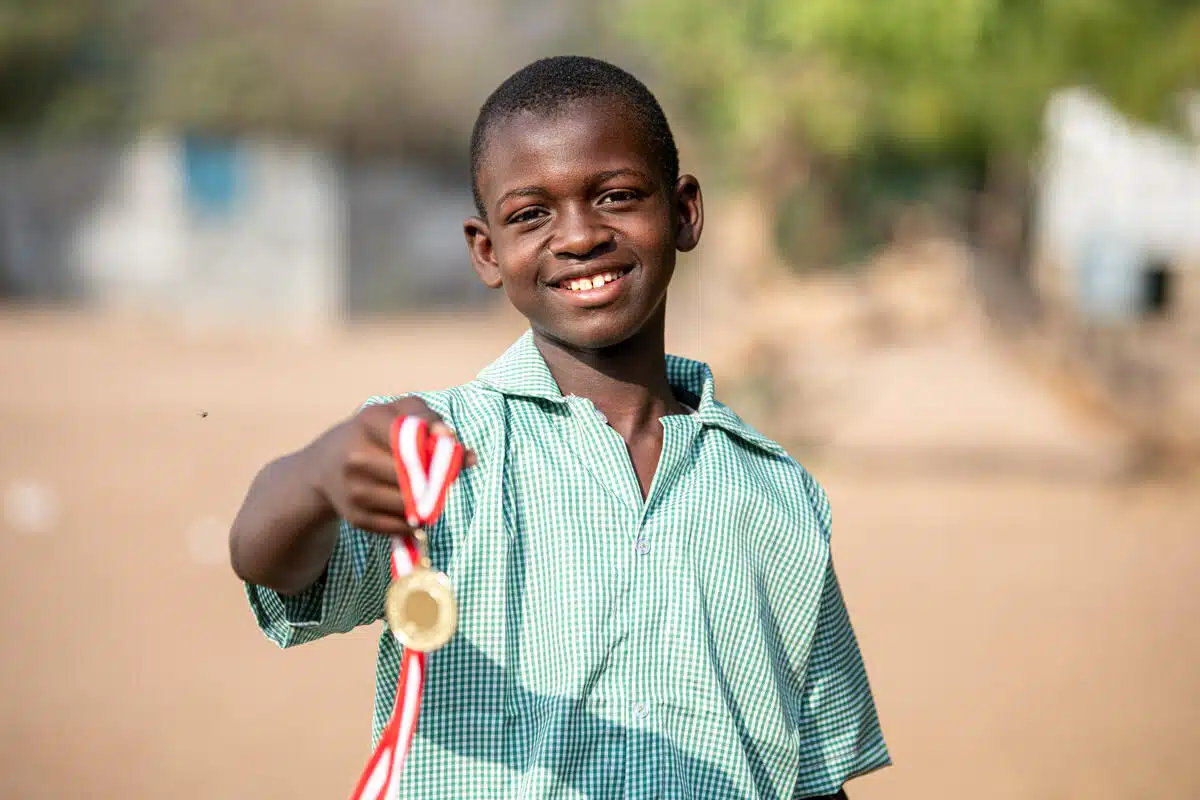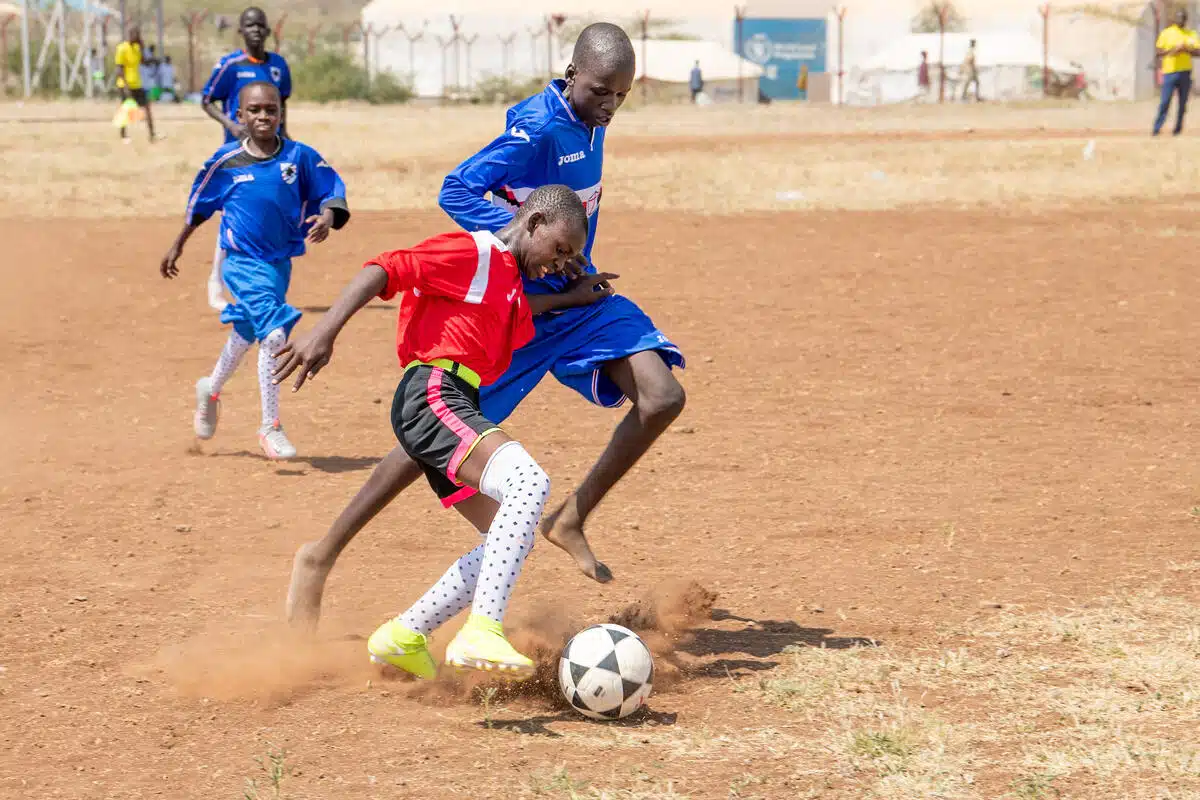
Abdirahman Sheuna, 14, poses with a medal he won at the “Kakuma Football Festival for Schools”. © UNHCR/Samuel Otieno
Football has become part of the fabric of young people’s lives in the Kakuma refugee camp, allowing refugees like Abdirahman to showcase their talents and follow their dreams.
By Samuel Otieno and Kathryn Porteous in Kakuma refugee camp, Kenya
As the sun sinks towards the horizon, casting long shadows across the dusty football pitch in Kakuma refugee camp in north-western Kenya, one player – Abdirahman Sheuna – stands out not just for his skillful feints and turns with the ball but because most of the other players tower over him.
At just 14 years old, Abdirahman’s determination to compete alongside older boys and young men reflects his ambition and passion for the beautiful game. His feet move gracefully across the dry, uneven ground, leaving clouds of dust and bamboozled defenders in his wake. His coach proudly gives him a thumbs-up.
He is training for a tough inter-school competition that was organized by UNHCR, the UN Refugee Agency, and the Turkana County Government. The event, dubbed the “Kakuma Football Festival for Schools”, coincided with the recently concluded African Cup of Nations (AFCON).
“When I play with kids my age, I don’t feel challenged, I gain a lot of skills playing against older players,” explained Abdirahman.
Young people account for the majority of the 275,000 refugees living in Kenya, and football is by far the most popular pastime. It has become part of the camp’s fabric, with 26 professional men’s and women’s teams in Kakuma and hundreds more amateur sides, providing a rare opportunity for youngsters to express their talent and pursue their dreams.

Abdirahman Sheuna (in red jersey) battles for the ball against players from a local primary school at the “Kakuma Football Festival for Schools”. © UNHCR/Samuel Otieno
Abdirahman was born in Kakuma in 2010, just two years after his parents and older siblings crossed the border into Kenya fleeing conflict in Somalia.
“Kakuma is a good place. There are no wars, it’s just calm,” Abdirahman said. “If I am lucky enough to leave Kakuma to go to other places far away, there are many things that I will miss.”
After a long training session, Abdirahman walks back towards his family’s home with his teammates, each talking about their hopes for the future.
“In Kakuma, we all have dreams; some want to be great footballers and relocate to other places, some want to be great musicians, but … we do not get the opportunity to showcase our talents,” he said.
Football has become an important part of Abdirahman’s life and a uniting force among the diverse communities in the camp where he lives, bringing together players from different cultures and backgrounds.
“Kakuma has a long history of sporting achievement and UNHCR understands that sport can be an important tool for protection,” said Nicolas Kaburaburyo, head of the UNHCR Sub Office in Kakuma. “Here in the camp, football gives refugees a sense of belonging, boosts their self-confidence and offers a source of hope away from home. We will continue to work with the refugee community and partners to enhance sports activities.”
At home, Abdirahman’s father, Sheuna Hamadi Hussein, who was also a footballer in his youth, describes his son as fearless.
“I, too, used to play jersey number 6,” he said. “But he is a little better than me, he is quicker. Older players sometimes try to knock him down because he embarrasses them. But he doesn’t like to play with other kids [his own age], he likes to play among grown-ups.”
“My hope is that Abdirahman will one day change his life and our lives through football,” added Sheuna.
Despite Abdirahman’s talent and drive, his dreams of becoming a professional footballer face a number of challenges in the camp, including a lack of decent equipment and space to play as many pitches become swallowed up to house the increasing camp population.
“We do not have balls and jerseys and many more. But despite this, we use whatever we can to train,” he said.
On the day of the tournament, Abdirahman’s team played in the under-14 male category, but were beaten by a team from the local Kenyan Pokotom Primary school in the first round.
Abdirahman took the setback in his stride, using the experience to motivate him further and draw inspiration from his hero Sadio Mané, whose Senegal team lost to host nation Ivory Coast in the quarter finals of the recent AFCON tournament.
“I hate leaving a match without scoring, so I tell myself to go back and train harder,” he said. “I dream of being like Sadio Mane because he has experience … he is strong and he believes in himself when playing football.”
Back at school, Abdirahman proudly displayed his medal for taking part in the tournament as he recounted his exploits on the pitch to his school friends.
“When I play football, I feel great, I feel famous, I feel like I’m the best in the game.”
“When I play with kids my age, I don’t feel challenged.”
Abdulrahman Sheuna
Originally published by UNHCR 5 April 2024


